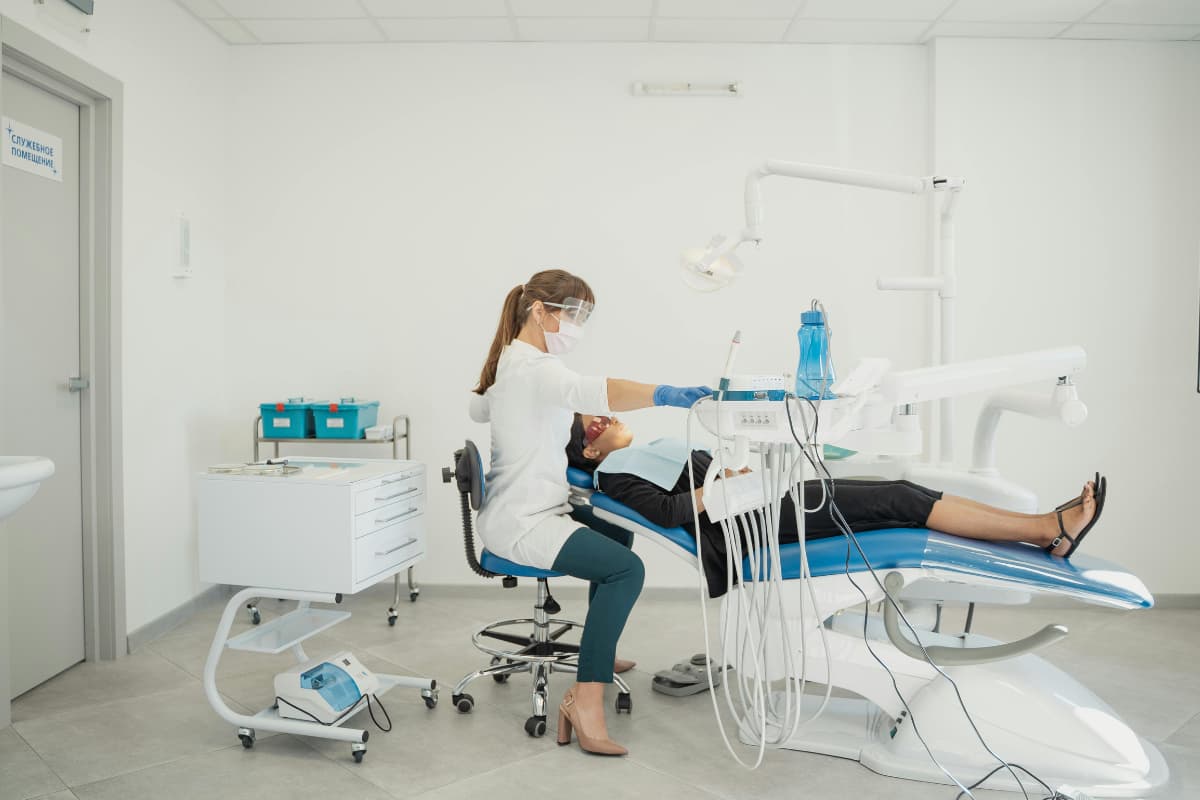What are the tasks of a ZFA?
In a dental practice, dental professionals perform a variety of tasks that are essential for the smooth process and successful treatment of patients. Her activities are both administrative and medical in nature and include the following areas:
- Organizing practice operations: Planning and coordination of treatment appointments, ensuring the usability of rooms, devices and instruments.
- Assistance with examinations and treatments: Support for dentists during treatments; depending on additional qualifications, ZFAs can take on extended tasks such as prophylaxis, prosthetic and orthodontic assistance.
- Preparation of materials: On the instructions of the dentist, prepare fillings and impressions for dental impressions and take X-rays.
- documentation: Recording and documentation of treatment processes and services provided for reckoning.
- patient care: Care for patients before, during and after treatment, explanations of preventive measures and guidance on oral hygiene.
- Administration and correspondence: Processing correspondence with health insurance companies and laboratories, checking incoming payments and carrying out company dunning.

What makes for a good ZFA? Which skills are required?
A successful ZFA is characterized by a variety of skills and characteristics that are essential for everyday practice. Here are some of the most important skills that a good ZFA should have:
- organizational talent: A ZFA must be able to organize practice operations, coordinate appointments and ensure that all necessary materials and equipment are available.
- attentiveness: Working precisely and paying attention to details are crucial in dentistry. An attentive ZFA recognizes potential problems early on and can respond precisely to the dentist's instructions.
- empathy: Dealing with patients requires empathy and understanding. An empathic ZFA can calm patients down and make their treatment more pleasant.
- sense of responsibility: A ZFA has great responsibility for the health and well-being of patients. A sense of responsibility and reliability are therefore essential qualities.
- dexterity: Handling dental instruments and materials requires precise and skillful work. A steady hand and fine motor skills are important here.
- flexibility: Everyday practice can pose unforeseeable challenges. A good ZFA should be flexible and able to adapt quickly to new situations.
- No fear of contact: Working in a dental practice requires direct contact with patients and their oral cavity. A good ZFA should not be afraid of contact and feel safe dealing with people.
- discretion: Patients' confidential information must be protected. Discretion and the ability to securely handle sensitive data are therefore essential.
- ten-finger system: Good control of the ten-finger system enables fast and efficient work on the computer, which is particularly advantageous when it comes to documentation and billing.
Of course, prospective ZFAs, already employed ZFAs or even dentists should not forget: The points described here are the best. But no one starts off perfectly and no one is flawless. You should therefore be able to allow room for growth and optimization potential. Don't worry if one or more of these aspects is still lacking.
Digital innovations in dentistry for ZFAs and dentists
Digitalization has also found its way into dentistry and brings with it numerous innovations. These can visibly increase the efficiency of dental practices while relieving ZFAs at the same time:
- If you are a ZFA, you are welcome to tell the dentist at your practice about these options.
- If you are reading this text as a dentist, reflect on which of the following elements could be used to optimize your practice.
While we show the general options in this chapter, we look at optimizations in very specific workflows and processes in the next section. Let's start with general practice optimization options:
- practice management software: Modern practice management software solutions enable efficient scheduling and patient management. These systems are user-friendly and help zFAS complete administrative tasks faster and without errors.
- Digital health records: The move from paper-based to digital health records facilitates documentation and access to patient data. zFAs can collect and retrieve information faster and more precisely, which optimizes the treatment process.
- patient communication: Tools for digital communication, such as email reminders and SMS notifications, improve patient care. ZFAs can use these tools to confirm appointments, send reminders, and provide patient information. By the way, such follow-ups and reminders, e.g. to sign documents, can Very comfortable with Nelly be sent to patients via SMS. Other processes such as invoices and receivables management can also be digitized with Nelly.
- telemedicine: In times of telemedicine ZFAs can support the preparation and follow-up of online consultations. They help organize virtual appointments and communications with patients via digital platforms.
- X-ray diagnostics: Digital X-ray equipment and imaging techniques provide faster and more accurate diagnosis. ZFAs can use these technologies to create and manage X-rays more efficiently.
- Digital impressions and 3D printing: The use of intraoral scanners to create digital dental impressions replaces traditional impression techniques. 3D printing technologies enable the rapid production of models, splints, and other dental devices.
- cloud computing: Storing data in the cloud enables secure and location-independent access to important information. This makes collaboration within the practice team easier and improves data management.
These digital innovations can significantly simplify the daily work of ZFAs, increase efficiency and improve the quality of patient care. By familiarizing themselves with these technologies, ZFAs can make their contribution to a modern and future-oriented dental practice.
As you've already seen: There are far-reaching opportunities to digitally optimize practice and thus reduce the workload of practice staff. For example, you can give your patients their Anamnesis with Nelly Have it filled out from home
6 practical tips on how to relieve your ZFAs & make processes more efficient
1. Delegation of tasks
Routine tasks such as billing and ordering can sometimes be delegated to specialized employees or external service providers. This relieves the ZFA and gives it more time for patient-related activities. ZFAs with additional qualifications can take on special tasks, which relieves the dentist's workload and allows them to concentrate on more complex treatments. A clear distribution of tasks contributes to better organization and efficiency. In general, the statement can of course also be submitted to the ZFA. Providers such as Nelly can digitize this process and is therefore easy and uncomplicated for zFAs to handle.
2. Optimizing work processes
The introduction of standardized processes for recurring tasks can significantly increase efficiency in practice. Using checklists to prepare treatment rooms and instruments ensures that nothing is overlooked and that preparations are completed more quickly. This standardization reduces errors and ensures a smoother workflow.
3. Continuing education and training
Regular training and continuous education of ZFAs improve their skills and knowledge, which leads to greater efficiency. In particular, training on the use of new devices and software can optimize the use of digital solutions. Well-trained ZFAs are better able to perform their tasks independently and competently, which relieves practice overall.
4. Patient communication
The implementation of automated reminder systems, such as SMS or email notifications, can reduce the number of missed appointments. This helps to plan practice operations better and to use resources more efficiently. In addition, the provision of information material on Patient education Clarify many questions in advance and reduce the need for rework. Well-informed patient communication contributes to smoother processing of appointments.
5. Ergonomic work environment
One ergonomic work environment with well-organized workplaces and suitable furniture reduces the physical load on ZFAs and increases their productivity. Regular breaks and recovery phases are also important in order to maintain the performance and motivation of the staff.
6. Effective team communication
Regular team meetings promote exchange and coordination within the team. A transparent and clearly defined distribution of tasks ensures smooth processes and minimizes misunderstandings. Good communication within the team is crucial for efficient collaboration and the success of the practice.

conclusion
In summary, it can be said that dental professionals play a central role in dental practice and make everyday practice smooth through a variety of tasks. By using modern technologies and efficient organization, both ZFAs and dentists can be relieved, which leads to better patient care.
Regular training and the use of digital solutions such as electronic health records and automated reminder systems help to further optimize work processes and reduce administrative costs.
Providers like Nelly can help you digitize your practice and thus make your practice processes more efficient. Would you like to find out where there is a need for optimization in your practice? Please feel free to contact us here.
Frequently asked questions
Is ZFA a stressful job?
Yes, working at ZFA can be stressful. Heavy workload, multiple simultaneous tasks, and dealing with patients can cause stress. However, stress can be significantly reduced through better planning and the use of digital solutions, such as practice management software and digital patient records. These tools help to make everyday practice more efficient and to reduce workload.
What do you have to be able to do as a ZFA?
As a dental assistant (ZFA), you need a variety of skills and competencies to successfully master everyday practice. The most important include:
- dexterity
- organizational talent
- attentiveness
- empathy
- flexibility
- sense of responsibility
How much do you earn as a ZFA?
The salary of a ZFA dental specialist may vary depending on professional experience, location, practice doctor and additional qualifications. On average, you can expect roughly the following salary ranges:
- Young professionals: approx. 1,800 to 2,200 euros gross per month
- With professional experience: approx. 2,200 to 2,800 euros gross per month
- With additional qualifications: up to 3,200 euros gross per month or more
What degree do you need for ZFA?
In order to start training as a dental specialist (ZFA), a lower secondary school diploma or an intermediate education qualification (secondary school diploma) is usually required. Some practices prefer applicants with a higher school diploma, such as the Abitur, but it is not a mandatory requirement. Interest in medical topics, manual skills and good communication skills are also important.
What are the tasks of a ZFA trainee?
ZFA trainees take on many tasks, which they carry out even after completing their training. They assist with patient care, assist with treatments, prepare materials, document treatment processes and help with administrative tasks such as scheduling and billing. They learn how to use dental equipment and how to comply with hygiene standards.
How long does it take to train a ZFA?
The training to become a dental assistant (ZFA) usually takes three years. During this time, trainees go through both practical phases in dental practices and theoretical lessons in vocational schools.
How much do ZFAs earn during their training?
The salary during training varies depending on the region and practice, but is based roughly on the following values:
- 1st year of training: approx. 900 to 1,000 euros gross per month
- 2nd year of training: approx. 950 to 1,050 euros gross per month
- 3rd year of training: approx. 1,000 to 1,150 euros gross per month











